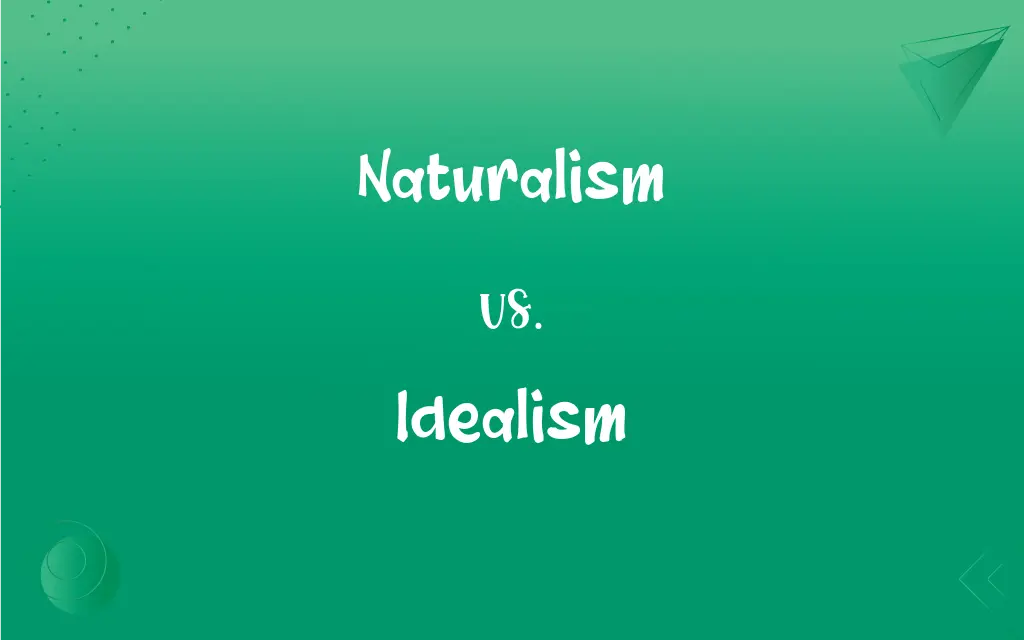Naturalism vs. Idealism: What's the Difference?
Edited by Janet White || By Harlon Moss || Updated on October 13, 2023
Naturalism emphasizes observable realities, often focusing on material and physical aspects. Idealism posits that ideas or consciousness form the fundamental reality, often assigning reality to immaterial entities.

Key Differences
Naturalism anchors itself in the material and the physical, holding a lens to the tangible aspects of existence. Idealism, however, sails on the sea of ideas and consciousness, prioritizing the intangible and the conceptual over physical forms. Naturalism probes the physical world for answers and explanations, employing scientific methods and empirical inquiry as its tools. In stark contrast, idealism dwells more on the metaphysical, exploring the realms of consciousness, thoughts, and ideals as foundational realities.
In realms of ethics, naturalism would likely find moral roots in evolutionary biology and psychological constructs. Idealism, however, might view morality through the lens of intrinsic universal principles or metaphysical truths, distancing its explanations from purely physical origins. Naturalism would explore the evolutionary and sociobiological underpinnings of ethical behavior, while idealism might seek ethical grounding in moral truths or spiritual insights, potentially independent of physical reality.
Aesthetically, naturalism often seeks to represent reality accurately, embracing the flaws and imperfections that permeate the physical world. Contrarily, idealism in aesthetics might elevate the subjective, possibly aspiring to represent an idealized or perfected version of reality. Naturalism in art might embody detailed and authentic depictions of the world, whereas idealism may portray elevated, often perfected versions of entities, expressing ideals over actualities.
In terms of knowledge acquisition, naturalism tends to emphasize empirical evidence and sensory experience. Idealism, conversely, might allow for knowledge to be obtained through introspective or metaphysical exploration, venturing beyond the empirically verifiable. While naturalism finds its truths in empirical and observable facts, idealism might argue that truths can also stem from introspective and philosophical exploration, potentially devoid of physical referencing.
In philosophical discussions about existence, naturalism could argue that existence is confined to the physical realm, and entities are as they are observed. Idealism, on the other hand, might posit that the physical world is a manifestation of an underlying non-material reality. The crux of naturalism may lie in the observable and verifiable entities around us, whereas idealism might look beyond, proposing that the seen is a reflection or manifestation of unseen, underlying immaterial truths.
ADVERTISEMENT
Comparison Chart
Focus
Prioritizes physical and material aspects.
Centers on intangible ideas and consciousness.
Ethical Basis
Rooted in evolutionary and physical bases.
Might be grounded in universal moral truths.
Aesthetic Approach
Tends to represent reality authentically.
May portray an idealized or perfected reality.
Knowledge Acquisition
Emphasizes empirical evidence and experience.
Allows knowledge through introspection and metaphysics.
Existential Perspective
Confines existence to the physical realm.
May see physicality as a manifestation of immaterial truth.
ADVERTISEMENT
Naturalism and Idealism Definitions
Naturalism
Naturalism in literature involves story-telling that mimics real-life situations and characters.
The novel was praised for its naturalism, offering a window into ordinary lives.
Idealism
In art and literature, idealism involves the representation of things in an ideal or perfected form.
The sculptor’s work reflected idealism, presenting humans in an impeccably ideal form.
Naturalism
Naturalism is a philosophical viewpoint attributing existence primarily to the physical world.
The biologist adhered to naturalism, seeking answers through observable phenomena.
Idealism
Political idealism entails the pursuit of noble ideals, often regarding notions of freedom and equality.
The revolutionary was driven by political idealism, striving toward a utopia of equality and justice.
Naturalism
In art, naturalism pertains to accurate, detailed representations of reality without idealization.
His paintings showcased naturalism, reflecting genuine, unaltered depictions of landscapes.
Idealism
Educational idealism emphasizes the importance of developing the mind and spirit, often valuing the classical and the theoretical.
The teacher’s idealism prioritized cultivating thoughtful and morally conscious students.
Naturalism
Naturalism in science involves interpreting phenomena based solely on empirical and observable data.
The researcher's naturalism was evident in his reliance on empirical data to draw conclusions.
Idealism
Ethical idealism implies that moral values may be grounded in metaphysical truths or intrinsic moral principles.
Her idealism prompted a belief in universal rights applicable to all beings.
Naturalism
In ethics, naturalism posits that moral values have origins in physical and social circumstances.
Naturalism guided her ethical standpoint, rooting moral values in evolutionary and social contexts.
Idealism
Idealism is a philosophical doctrine that prioritizes the mental, conceptual, or spiritual over the physical.
His belief in an afterlife was rooted in a form of spiritual idealism.
Naturalism
The practice of describing precisely the actual circumstances of human life in literature.
Idealism
The act or practice of envisioning things in an ideal and often impractical form.
Naturalism
The practice of reproducing subjects as precisely as possible in the visual arts.
Idealism
Pursuit of one's ideals, often without regard to practical ends.
FAQs
How does idealism view reality?
Idealism often views reality as being rooted in mental or spiritual entities.
How might idealism influence political theory?
Idealism in political theory may promote the pursuit of high ideals like universal peace and justice.
What might be a key ethical belief of idealism?
Idealism might posit that ethical truths exist as universal, non-physical principles.
How does naturalism approach scientific inquiry?
Naturalism typically approaches scientific inquiry through empirical methods and observable evidence.
Does idealism always imply a disregard for physical reality?
Not always. Some forms of idealism may acknowledge physical reality but posit that it is secondary or emergent from a mental or spiritual reality.
Is naturalism atheistic by nature?
While naturalism often excludes supernatural explanations, it doesn’t inherently deny the possibility of a deity.
What is the fundamental focus of naturalism?
Naturalism primarily focuses on the physical and material aspects of the world.
How does naturalism view moral values?
Naturalism may view moral values as having origins in physical, psychological, or social phenomena.
Does idealism necessitate a belief in the supernatural?
Not necessarily, but idealism often involves placing fundamental reality in non-physical entities or principles.
Can naturalism incorporate spiritual beliefs?
Typically, naturalism prioritizes observable and empirical realities, often excluding spiritual or supernatural beliefs.
How might idealism view the nature of existence?
Idealism might view existence as stemming from or being shaped by non-physical realities, such as consciousness or spirit.
What is a primary criticism of idealism?
Critics may argue that idealism lacks empirical evidence and relies heavily on metaphysical speculation.
Can idealism inform practical decision-making?
Yes, idealism can guide decisions by aligning them with overarching ideals or ethical principles.
Can a worldview integrate both naturalism and idealism in understanding science?
Though challenging due to foundational differences, some worldviews may seek a middle ground, embracing scientific empiricism while maintaining metaphysical beliefs.
How is naturalism typically represented in literature?
Naturalism in literature often involves realistic, sometimes deterministic depictions of everyday life and characters.
In what way might idealism influence art?
Idealism in art may involve portraying subjects in a perfected or idealized manner.
Can naturalism engage with metaphysical questions?
Naturalism generally avoids metaphysical speculation, preferring explanations rooted in observable and empirical data.
Can idealism provide a basis for ethical or moral education?
Yes, idealism can inform moral education by positing that certain ethical principles or values are universal and intrinsic.
Can naturalism and idealism coexist in a philosophical framework?
While they have contrasting foundational beliefs, some philosophical frameworks may try to integrate aspects of both.
How might naturalism and idealism approach the concept of mind?
Naturalism may see the mind as emergent from physical processes, while idealism might view mind or consciousness as fundamental to reality.
About Author
Written by
Harlon MossHarlon is a seasoned quality moderator and accomplished content writer for Difference Wiki. An alumnus of the prestigious University of California, he earned his degree in Computer Science. Leveraging his academic background, Harlon brings a meticulous and informed perspective to his work, ensuring content accuracy and excellence.
Edited by
Janet WhiteJanet White has been an esteemed writer and blogger for Difference Wiki. Holding a Master's degree in Science and Medical Journalism from the prestigious Boston University, she has consistently demonstrated her expertise and passion for her field. When she's not immersed in her work, Janet relishes her time exercising, delving into a good book, and cherishing moments with friends and family.
































































